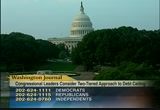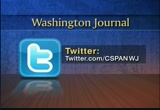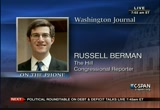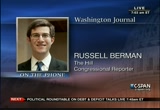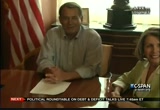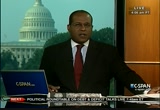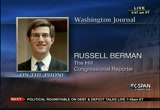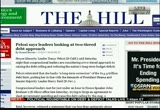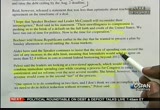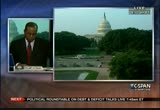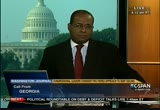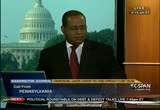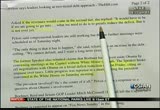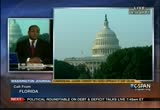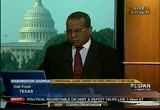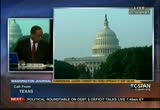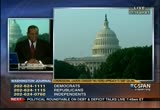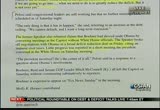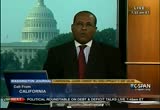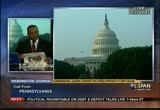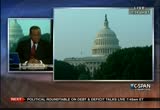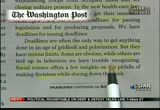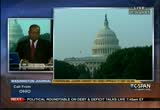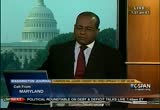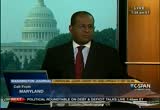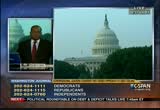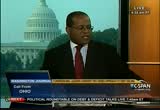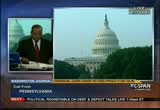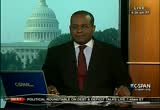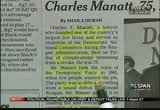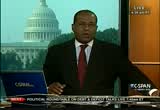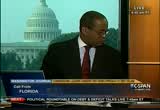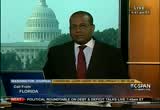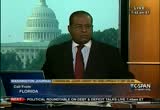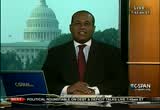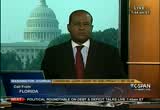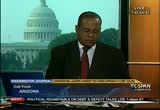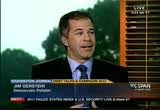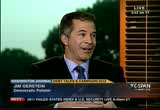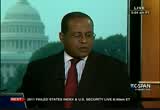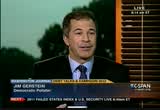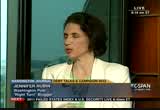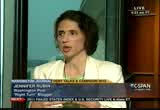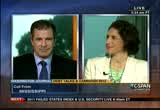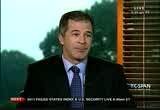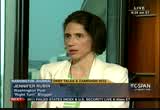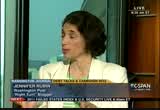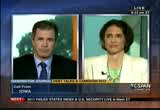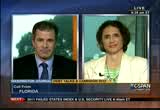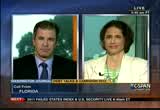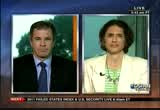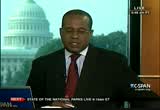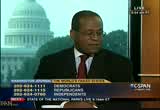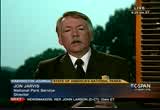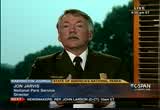tv Washington Journal CSPAN July 24, 2011 7:00am-10:00am EDT
7:00 am
they will talk about the debt reduction negotiations and how both parties are gearing up for the 2012 elections. jj. mesner discusses the 2011 failed state index and later the national parks service director will talk about the state and safety of national parks. "washington journal" is next. ♪ >> closed-door negotiations continue today as the congress and the president are trying to find a solution to the dead seven crisis. being discussed this morning is a two-tiered approach which will be the topic of our conversation for the first 45 minutes of this edition of "washington journal." it is being reported --
7:01 am
nancy pelosi reiterated that she backs a long-term extension of the $14.30 trillion debt limit putting her in line with the demands of president obama and senate majority leader harry reid. we want to get your comments and thoughts about that. the numbers are on your screen. you can send us an e-mail at journal@c-span.org.
7:02 am
here to talk to us by telephone and a little bit more about this two-tiered debt approach is russell berman who is a congressional reporter for "the hill." tell us what is this two-tiered approach? guest: it looks like they would increase the debt limit and put in place some immediate spending cuts in the first tier and then in the second year, set up a process for congress to consider long-term entitlement reforms and tax reforms. that is where we stilts' have some apparent disagreement. the president and the democrats are demanding that the debt limit be increased through the next election. the republicans want dollar per
7:03 am
dollar spending cuts, as many spending cuts as the debt ceiling is increased by. that is where they are still at an impasse. it might be tough to find $2.40 trillion in spending cuts which is what would be needed to match the $2.40 trillion debt increase to get us through next year. host: how much discussion has been put into this two-tiered approach? give us a sense of how this approach was developed and put out there for discussion yesterday. guest: it is unclear on the details. it seems that there are a couple of different options but we know this is something that was talked about between speaker john boehner and president obama in their negotiations that the
7:04 am
speaker ended friday. they simply do not have the time right now to overhaul the entitlement program and overhaul the tax code before august 2. they want to make sure that congress actually does act leading up to the election year. they would put in place when option which is that they would set up a congressional committee, another for the commission, that would make recommendations that would have to have a vote before congress. it could not be filibustered or shelved. another option that was talked about with the speaker and the president would put in place these triggers that would not be a committee but would say that congress -- if congress does not act by certain dates, the bush
7:05 am
tax cuts for the high income people would expire automatically. that is something the democrats want and republicans oppose. on the other side, we would see either a repeal of the individual mandate for health care and the idea is to inflict political pain on both sides so both parties have an impetus to act in congress. that is something that john boehner and president obama could not agree on so it is unclear if that proposal is still on the table in the talks over last 24 hours. host: how much discussion or negotiation will be going on on capitol hill today? are there any plans for the leaders of the congress on the house and senate side to go back to the white house this afternoon? guest: we caught up with nancy pelosi leaving the capital about 7:00 -- seven purpose --
7:06 am
7:30 and she said there were no more meetings scheduled. at the very least, the congressional leadership will meet again because both sides have said that they want to present a plan as early as this afternoon to avoid ruffling the asian markets when they open later today and to avoid ruffling the u.s. markets to more morning. the need to present a plan to their conferences so they can start the legislative process. that will take a few days for anything to pass in the house and senate. host: how much of an awareness to these leaders have that the rest of the world, particularly the asian markets, are watching what is going on in washington? what kind of pressure to the field to get something done this
7:07 am
afternoon so that those markets and later on in the day, the european markets are not rattled as those folks go to work on monday morning? guest: there is a lot of pressure. john boehner had a conference call with thall of this house republican members yesterday. he specifically mentioned the need to get something out there for the asian markets to see. they did not confirm this but going back to friday, the president complained that the speaker was not on the phone call. that might want to break -- broken down these negotiations set to the market closed. it took about an hour or two after the market's close. this is something they are very aware of because that is the big fear that if the u.s. goes past august to and as they get close
7:08 am
without any deal or from work or options, that the markets which have been expecting them to reach a deal will start to teteeter. host: the increase of the debt limit and a reduction in conjunction with spending cuts and the second tier is the entitlement reform, correct? guest: that's correct. the second tier would be set up a process in congress whether it is committee for a certain date that congress has to act by through its normal process -- that is what they are talking about right bell. host: russell berman of of the hill. you can read his articles on
7:09 am
7:10 am
we will get back to this article by russell berman and you confided atthehill.com. let's go to our phones. caller: our you doing? host: what do you think about this two-tiered debt approach? caller: i think it is a tactic to get to the presidential election in 2012. i would like to know if the republicans are bent on destroying the new deal. what will they replace it with to keep our society, our government going? host: why do you think this two- tiered approach is targeted at the 2012 elections? caller: that's politics. that's how host: they play the cod,let's move on to cape mass. on our line for
7:11 am
republicans. caller: good morning. i am delighted to see they are making some progress. it seems to be they are making progress and i sincerely hope they can reach an agreement. one of the things that troubles me is on the page you just had on television, they put in the words "tax reforms." tax reforms sounds good. we are in favor of reform. one thing that has been talked about is closing tax loopholes and that sounds good. one of the things that is out there has been the abolishment of the interest deduction for people on their homes. i sincerely cannot believe that they are talking about doing away with the home interest tax deduction. the housing market in america is so flat amount back, to further
7:12 am
penalize the housing market in that we would just be unthinkable, in my mind i sincerely hope they don't do that and they stopped talking about it. maybe down the road at some point in time you could do away with the home interest deduction but there are so many jobs in america related to housing -- all the things that relate to construction -- to further penalize the housing market would be disastrous host: we move on to clayton, georgia. caller: good morning. the article you just spoke of was from the minority leader. since the minority leader is not in power, why would be -- why would be be spending time thinking about what she said when it will be the majority leader that will have to put a bill forward?
7:13 am
the thing that concerns me -- if the democrats would go and put something across so everybody could vote on it, couldn't meet somewhere in the middle? it would appear they could get this thing started. they keep saying they will do something and they don't put anything in writing. that seems like we're the problem is. host: beyond the fact that this talks about the two-tiered approach from the perspective a house minority leader nancy pelosi, what are your thoughts about the approach? they would increase the debt limit, deal with spending cuts, and at a time beyond that, to look at entitlement reform? caller: i agree with one of your earlier callers. i think it is a stalling tactic. i think they're just wasting time.
7:14 am
the need to put a bill out there, let the folks vote on it, take it to congress, and a great what needs to happen. it is a stalling tactic. host: more from the article by russell berman -- pennsylvania, patrick on our live for independence, good morning. caller: the only tears that would be shed under a two-tier approach would be those in congress looking for re- election. i find it funny that the president calls the $250,000 of
7:15 am
those that should pay more -- why don't they make it $171,000? isn't that what the members of congress start at? if they paid more, maybe they would pay attention. i believe congress is serious about legislation -- they should make a flat tax for every citizen and a flat tax for every corporation. they say close loopholes. what about general electric that because of their overseas profits, they don't have to claim them in america? if they are going to tax everyone equally, why don't they make it 10% for every citizen and 12.5% for corporations and that would generate job growth? two-tiers is a tactic to argue the point more and posture for reelection and the dollar continues to devalue. host: this is more from the article --
7:16 am
what are your thoughts on that? caller: i believe the comment of revenues coming in the second tier -- that is an end to support for a kind of thing. it would be like you going out and buying a new quarter million dollar motor home thinking you'll get a pay raise. they have to pretend things now to encourage that revenue to come in. that comes from job growth. as the foreign markets set back and wait to see what we do, our dollar continues to devalue and time is against us. we are starting to look like greece and that is a strategy for a superpower like america. host: let's move onto flore, independent line. caller: if they're serious about
7:17 am
the talks, if they cut their pay and don't get paid, they could probably sell the problem. host: we will move on to houston, texas on our line for democrats. caller: thank you, i enjoy your show and watch it all the time. a couple of years back, we were told we had $13 trillion in the social security entitlement situation. i would like to know what happened to that? it was not supposed to be touched. we are also borrowing money off our bonds. if the united states cannot get our government to do it, we can get all this money for somalia and haiti. why can we put out a call for them to send it what they can to the government and let the people get this out of debt by everybody contributing $1 or $10
7:18 am
or $15 and send it? if we can get these other countries and help them, why can't we help ourselves? host: we have this tweet -- cspanwj if you want to send us a tweed to this morning. caller: good morning. i hope you have a great day. i am very concerned about crime or northwest. i have seen many programs with him on it. it seems like he is controlling the republicans. one caller said that president obama has not submitted any thing. i believe he has submitted the part of going ahead and cutting
7:19 am
some of social security and medicare that i am against. why is there when calling it an entitlement. it has been coming out of my paycheck for over 30 years. they need to get it going and settle this. i think they are also punishing president obama. at one time, he voted against the debt limit for bush. host: what you think about the second tier of this two-tiered approach? caller: i don't like it. why are we not cutting? everyone seems to go back to social security and medicare and we have paid out of our pocket. i am still working so i am still paying. what happened to the cuts for the pentagon. most of that does not go to the soldiers. what about permissible companies -- what about pharmaceutical companies and others?
7:20 am
7:21 am
texas, susan, on our line for democrats. caller: good morning. i will comment about this grover norquist. i think it is absolutely disgusting -- especially these new republicans have signed their pledge to him even though he says it is not to him as opposed to their pledge to the united states of american citizens. the flat tax -- that has been well proven that that only hurts the middle class than the lower class. the debt ceiling should be taken care of now and they can play
7:22 am
their games with this other stuff later. i would very much encouraged everybody to go to the website, alec.com or .org and you will understand what is going on here. is the american legislative exchange council. it is very scary stuff. everybody needs to look it up and see what is going on. this is what is causing these tea baggers to be so staunch. host: elkhound, calif., on our line for republicans. caller: would not raising the debt ceiling be exactly the same as a balanced budget amendment? it would force them to redistribute the money appropriately. i think is the same thing. i don't think they should raise the debt ceiling.
7:23 am
host: what do you think about the two-tiered approach? caller: if you don't raise the debt ceiling it will not make a difference. if you don't do something next year, the way politicians go, they will not do anything anyway. that is the way it always goes. host: pennsylvania, on our line for independence, go ahead caller: social security is self-funding and is not part of the debt problem it needs to be left alone. the two-tiered approach is a natural accounting principle. and one understands that.
7:24 am
part of the problem is that the person who earns $50,000 or less in this country pays taxes on every single dollar. a person who earns $500,000 per year in this country pays taxes on 20% of their income. there is a huge revenue on that other 4/5 of their income and what are they not paying their fair share which would be taxes on every dollar they earn? the third day is that a lot of this is electioneering. if someone looks carefully at some of the issue, there is a discussion about not raising the debt limit beyond 2012. obviously, that has to do with the election. our current incumbent does not want to take a beating at election time. host: this is an op-ed in this
7:26 am
that is by daniel cooper in this morning's "washington post." we continue our discussion involving the two-tiered approach to solving the debt ceiling problem. it is an article you can find at thehill.com this morning. cleveland, ohio, on our line for democrats, go ahead caller: good morning. host: what you think about the two-tier approach? caller: it sounds like the republicans are always fighting for money and the democrats seem to be fighting for the people and the programs that help people. why is it when we are in discussions about who is getting what -- the democrats are trying to save programs, the republicans are trying to save money.
7:27 am
this is hurting the programs and the people. it is almost like it is mom and dad in your hat. mom is fighting for the kids to go to a ballet class and dad says we can't afford it. who is looking out for the people? it seems the democrats are looking out for the people. what host: do you think about the two-tiered approach? i think they are setting up to the bush tax cuts don't get repealed. they are all in for these tax cuts. they won't do anything just like unemployment. they will do anything to keep these bush tax cuts. that goes to show you how big and important they are. host: we will leave it there and move on to glen burnie, maryland, on the republican line. caller: i hope the republicans
7:28 am
are not allowing this diversion into this two-tiered approach to get them off the most important part of all that with it -- which is the balanced budget amendment. john boehner had his news conference the other day and said he had to step away from the tree to see the forest. the forest is the fact that congress cannot control the spending without a balanced budget amendment. i wonder if anything is mentioned in this two-tiered approach about this balanced budget? as a realtor, the mention of the home interest deduction has caused problems. what buyer will buy a home now without knowing whether they will get a mortgage -- mortgage interest deduction. that is part of the reason to buy a home. if you think you're going to get a deduction after buying a home and then they will take it away, it has put a damper on the
7:29 am
housing market that is already devastated. host: thank you for the call. next is a joke in washington, d.c., independent line. caller: if we can have a compromise such as this two- tiered approach, so be it. anything to get us out of this crisis that is self-inflicted. host: let's take a look at what ben pershing is writing this morning.
7:30 am
dallas, texas, on our line for democrats. caller: good morning. i think people are not seeing the whole reality here. everyone is talking about how they have to pass this thing and there is this political posturing and meetings. the reality is the tea party people and their financial backers are all heavily invested in gold and they want to see the
7:31 am
nation default because this will cause panic in the financial system and cause the price of gold to skyrocket. they and their financial backers will make millions of dollars. i think it is all about money. host: south carolina, you are on "washington journal" caller: good morning. i believe they have the right november,rding to th 2010. it was voted by the majority of the people. that is why there is a new people in legislation to take care of this debt crisis. it needs to be cut, cappped and balanced. it if they don't cut the
7:32 am
spending, we will go over the edge. host: this is the lead in " the new york times." dayton, ohio, on our line for independent spirit calles. caller: i think congress is in same. there is no way we can balance our budget without doing some spending cuts but we also have to have revenue of. if we don't increase our revenues to restore social security, medicare, and medicaid to the people we have lost anyway. we have already lost our right to collective bargaining. they are making the american worker into a slave. they have no choice in which wage or benefit they work for any more. host: where would you raise the
7:33 am
7:34 am
7:35 am
they swear not to pay any taxes. they don't want to pay any taxes. that mywant to believe congress people are that stupid. anybody who says we don't have a revenue problem, we just have a spending problem, that is sick. if you have to borrow 42% of your money to pay your bills, you have a revenue problem. host: all right, let's move onto king of prussia, pa. on airline for republicans. caller: good morning. i am impressed by it with the republicans because they had decided to raise the debt ceiling even though they did not want to. they said they were willing to
7:36 am
do this to go ahead and pass the cap and trade bill and be able to cut down and control the spending in the future. i thought that was a great move on the republican standpoint that they were able to come all the way across even though in the past, obama would not even allow them in their meetings. they have come across and allowed them to raise the debt ceiling along with passing the amendment. host: let me show you this tweet -- what are your thoughts on that? caller: what do you mean? host: do you agree with it?
7:37 am
caller: i think the republicans would -- host: the want to talk about who gets blamed of the debt ceiling does not get rates. caller: i think they will raise the debt ceiling. they don't like the idea. we know that obama spent over $20 trillion in the administration and he want to go another $20 trillion more. that is far too much money that our government -- but without allowing them the debt ceiling and the only spending the money we can afford this point, i think it was a great move on the republicans' part that they were willing to do this. host: a couple of obituaries in this morning's " the new york times."
7:39 am
7:40 am
minnesota, mark on our line for independence. caller: hi, in regards to the two-tiered -- this seems like common sense. one side wants to raise revenue and one side wants to cut spending -- they should do both. to me, it seems like common sense. i want to interject that in the war on terror, i am a disabled veteran, our enemy wants to see as bankrupt. it seems we are on the verge of that. host: next up is boynton beach, fla., on our line for democrats. caller: as a senior citizen, i am concerned about medicare and social security.
7:41 am
this whole discussion about the economy has highlighted, for me, a more frightening problem which all americans should be concerned about and cspan may want to devote some time to end that is the fact that we seem to be moving away from a genuine representative democracy towards an oligarchy of the extremely rich. 10 years ago when the bush tax cuts were implemented, real wages have remained stagnant. that means purchasing power has been sucked out of the economy. when you have no purchasing power, you have no demand and it is demand that causes small- business is to create jobs. it is not a matter of whether our taxes go up a few percent or so. if there is no demand, there are no jobs created. i have money that was sucked out of the economy that went to the rich and we invested it not in jobs but it went into their own
7:42 am
pockets. they are currently spending that money in four significant ways. they are paying for the campaigns of people in congress will enhance their bottom line. they are paying for lobbyists and lawyers to influence the congressmen to enhance their bottom lines. they by media outlets to feed and theyc the probl pablum give the public a delusion that we still have a representative democracy. the fourth way they are spending their money to line their pockets is to spend it oversees to create jobs cheaply so they don't have to pay taxes to keep their money offshore so they don't have to pay taxes. and to enhance their bottom line even further. the extremely wealthy have become the incredibly wealthy this is an issue that concerns as an american and it should
7:43 am
7:44 am
our next call comes from clearwater, fla. on our line for republicans. caller: yes, i'm a longtime republican. all people who have paid any money into the social security fund whether 65 or 25 are considered social security beneficiaries. we should be concerned about money they have had taken from their paychecks. if there is a default declared, i would think people would refuse to have social security withheld from their paychecks in the future. i don't know how the fund would get into the government if nobody wants to pay their social security. the other thing i would like to say is i am concerned about the fact that if we come to a default, and the president declares it, he might also declare a declaration of martial
7:45 am
law which would suspend constitutional law. i am very concerned about that possibly happening and what the consequences would be for the nation. in my own state of florida, i notice my governor has recently purchased a home in montana. maybe that tells you something about what he expects the future to be. host: thank you. sun city, ariz., on our line for independence, good morning. caller: thank you. i think the american public is confused a little bit. i think one of the reasons is because many of the issues are masked and it would be great if there could be more transparency, a better edification for the american public, so they can see what is going on. i must've looked at five different media sources yesterday and i could not get a straight answer in my head which way things are going i am an
7:46 am
independent. there are some really great ideas on both sides. it is a shame we cannot get together. people are panicking and getting depressed and getting sick and they are giving up. america is such a strong country. i was looking in "popular mechanics" the other day and it is amazing what we are building and we are giving up so much of our technology. if we can get these people to the table and get to these issues and make a plan, some of obama's ideas are good and the republican ideas are good and there will have to be some cuts but would need to get into some action. the public is to have better transparency where they can see exactly what is going on for it if you listen to john boehner yesterday and obama, it was like two different meetings. i would like to see more transparency. i would like to see people be
7:47 am
able to start developing new technology. just go out and do it. host: we will have to leave it there. coming up in 45 minutes, a look at the failed states around the world. after this break, we will talk more about the debt talks and the 2012 campaign. first, this news update from cspan radio. >> beginning at noon on cspan radio every sunday, you can the news from the five network tv talk shows. topics on the program today include the budget negotiations and the debt ceiling and presidential politics. we begin with nbc's "meet the press." they will have white house chief of staff bill daley and senator tom coburn. at 1:00, abc pa "this week" with secretary of the treasury tim geithner and michael
7:48 am
bloomberg. fox news sunday is at 2:00 p.m. and chris wallace talks with secretary of the treasury tim geithner and joe walsh and maryland democrat donna edwards. at 3:00 p.m., it is cnn "state of the yen" with secretary of the treasury tim geithner and dianne feinstein, and gop presidential candidate and former minnesota governor, tim pawlenti. at 4:00 p.m. ,hear but "face the nation," with the bild daily, jon kyl, and senate majority whip dick durbin. the five network tv talk shows are barred -- brought to you as a public service by the networks and cspan. re those-airs begin at noon, eastern time. you can listen to them all on
7:49 am
cspan radio 90.1 in the washington, d.c. area and satellite radio nationwide at channel 119. you can also go online to cspan re.org. >> it is a behind this? look. the l.a. times says this should be required viewing. this is cspan's original documentary, "the library of congress." it is sunday night at 9:00 eastern on c-span. >> what would that have been like to have met these people when you did not know the ending? >> author eric larsen follows adolf hitler and the third reich in his latest book. >> i started looking for characters through whose eyes i could tell that story.
7:50 am
ideally, outsiders, ideally americans, and that is when i stumbled upon a e diem. dodd the first ambassador to nazi germany's >>. that is to night on"q &a." >> if you want to be informed about what is happening in the world and congress, it is not so hard. cspan has a digital are online archive that goes back to 1987. you can basically watch anything that happened to in the house or senate chambers right there on your screen. there are sources of information that are on a manageable -- were unimaginable 20 years ago. >> the cspan video library makes it easy to follow washington with instant access from events from the white house, a committee rooms, and the house and senate chambers. the peabody award winning cspan video library is washington,
7:51 am
your way. >> revisit the civil war this weekend on american history tv on c-span 3. we are alive today from the manassas national battlefield on the 150th anniversary of the battle of bull run would call in progress beginning at 11:00 a.m. eastern including dickinson college prevention pi fewnsker on abraham lincoln was programs throughout the weekend. get the complete schedule c- span.org//history. host: for the next hour, we will talk about the debt talks and campaign 2012. joining us is jennifer rubin from "the washington post." based on your reporting, where are we right now in terms of the debt talks and what do you think about this new two-tiered that approach?
7:52 am
guest: i think most of the media and political watchers have missed the story of the last week which is that nothing has really been happening at the white house for some time. those talks have gone nowhere and the press conferences you here and the statements are likely for show. what has been going on behind the scenes is some effort on the congressional level to strike a deal. that continues today. it did not just began yesterday when the white house and republicans who broke this off. it has been going on for some time. the senate leaders and the same thing on the house, from what i understand, there was a little speechifying last night about the statements. harry reid and the republicans are working quite corporative late. -- cooperatively. i expect that they will make a deal. i think the white house now is
7:53 am
in the role of the observer. they are on the sidelines. they will not have ownership of this deal and will not have any choice to veto what comes out of these talks. i think the solution will be this two-tiered program. the first step would be a relatively short-term extension. it may be $500 billion or trillion dollars can get to of mons on the calendar. there will be a second part in which larger cuts are proposed. i think it will borrow some from the mitch mcconnell deal to set up a commission to look at these issues. the simpson bulls committee did not require a congressional. vote. i think it will make a deal and i think it will be on the republican side. when we began this, it was a
7:54 am
clean debt bill they're looking for but that will might get that now. what are your thoughts on what you have been seeing? guest: we know that the leaders in congress and the president's want to get something done for the understand the gravity of the situation and now we cannot de fault. if we do, it will have horrible ramifications for the entire country and people around the world. the president has a lot of leverage. the american public really supports what he is doing. when you look at public opinion, they agree with his approach. they agree it has to include a mixture of tax cuts -- tax increases and spending cuts but they also looked at him as the adult in the room. what has happened in this debate
7:55 am
is it has reinforced everything people don't like about congress and. politicians they seem to be putting their own narrow political interest ahead of the and country's interest rate that look of the president and it looks like he is trying to rise above this. by virtue of the gravity of the situation and his office and his views and persona, he has a lot of leverage to use here in terms of getting the public behind him. host: a quick yes or no, will they get a deal done by august 2? guest: i hope host: so. yes or no? guest: we don't now host:. will they get a deal done by august 2? guest: i think they're well. host: we have a lot of time to talk about that but we want to let our viewers know they can get involved in the conversation. we're talking about the debt talks and later we'll get into camp in 2012 with jennifer rubin jim gerstein.iu
7:56 am
you can get to is by e-mail and twitter. our first call is from aberdeen, s.d., on our line for republicans. caller: nancy pelosi has talked about a two tiered system or the debt ceiling would be raised first and spending cuts would come later. if republicans agree to raise the debt ceiling, what would the republicans have to bargain with to make sure the democrats would cooperate in spending cuts? guest: republicans will not face that choice. we forget how far the debate has come. the caller points out that not only nancy pelosi but the white house was insistent on a so-
7:57 am
called clean debt raise and no one is talking about that now john boehner will get what you once in the short term but there will be cuts that are greater than the initial race of the debt ceiling. there will be a second part and they will fight it out over exactly what will be in that bill but i think the republicans have refused to do with the caller is concerned about . the senate operates in a 60-vote margin and their many red state democrats up for reelection in 2012. those people are under a lot of pressure to do a deal. cleare like clear miscas mccaskill cla --ire mccaskill will want to show something else.
7:58 am
host: we want to make a correction -- the independent phone number -- chicago, illinois, carl on our democratic ally caller: good morning. we have to start using more common sense. we are being duped. the republicans say this is a spending issue. many americans don't understand that this aspect of spending, what is being considered spending is fully expos. on c-span, one of the moderators had read an article that said this would add half a trillion dollars to the debt.
7:59 am
all these tax cuts come under the category of spending. the best part of the reassertion that spending is other things --. host: jim gerstein, go ahead guest: voters understand what is going on. they see politicians over and over taking care of their own pet projects. it might be the bush tax cuts and not letting those expire. we see the impact of that on the deficit. the intransigence of not being willing to part with that after eight years in office, i think that really gets through to a lot of people. on the republican side, people are frustrated that they don't see democrats to budging. the public sees the president
8:00 am
more willing to compromise. that came through in "the washington post" poll of last weekend that is what will drive this thing to the end. host: next up, holly springs, mississippi, independent line. caller: donald trump wants to set went to iraq and afghanistan because they were oil-rich nations. we won the war. i don't think
8:02 am
and buying debt these days. host: about what the question that those did contribute to the problems we are having right now. guest: everything did continue. the question is what percentage. i would disagree saying the president has tremendous leverage. he has no leverage. the democrats and the republicans and congress are going to make this deal. one or both of them are going to
8:03 am
leave town and dump it on his lap. the poling is really unhelpful, often ends in these things. on one hand they want cuts and spending. they an over 60% want the capital plan. the president is appearing more favorable than congress. the president always does. the president's rating have been going down dramatically. because of that. because the president doesn't feel comfortable, they don't want this issue to come up again until 2012. they don't want to have this again until 2012. they want to talk about other things. we have this situation now where this debate has paralyzed the
8:04 am
country when everybody wants to talk about jobs and how to create jobs. we focus around the country. the only thing people care about is am i going to keep my job, am i going to find a job and can i pay my bills. yes, the house and senate are going to come together and hopefully pass something. the consequences of not are catestrophic. the president has to sign it. they know what he will sign and what he won't sign. public opinion does line up with his decision of where he wants to take this. neither party is doing well. host: before we go back to the
8:05 am
poles, address jennifer reuben's thing about the president not being a player. in the poling and reporting around the country, do the people see the president as a player in this process? >> of course. they want him to succeed. people see him succeeding, that means the country is succeeding. he's the one that went out and and and captured and executed osama bin laden. host: let's go back to the phones from new york on the lines or the republican line. caller: my comment is that i wonder what planet the
8:06 am
democrat democratic pollers are from when they say that the president is perceived as the adult in the room. he had a super majority since 2008 and did nothing but try to destroy the country and now he's the one that's the hero in the room. as a self employed interior remodelling specialist. i am in someone's home everyday. i cannot tell you who or what person would stand by what this person has done in less than three years to this country. the bush blaming, doing away with medicaid and the talk of
8:07 am
throwing old people off the cliff coming from the democratic side is absurd. i hope and pray in 2012, we paining a serious change. host: we'll leave it there. i think what the caller is saying is reflective of a lot of people in the country. we hear very strong views against and very strong views supporting. we are all on planet earth the different is those who are in the middle right now, when you look at the poles, you see more
8:08 am
of the independent view of the world. we have a long way to go. >> i have to go back to the phones. >> i was just wandering when speaker bainer's turn was up and if he can be impeached? >> why do you ask that? why do you ask that? because i think he's for the rich. he's definitely for the rich. i think he thinks he is the president and obama is not. like he says many times, it's going to be his way or no way. i want my healthcare. i want my social security. i need it. >> we'll leave it there.
8:09 am
>> that's what voters soeted against. i do take exception to something not showing up in the poling or focus groups. the fact that they are not. independents are splitting very heavily on spending issues. they want less government. less services. less taxes. look at 2008, obama was able to put together this coalition the thing that comes up is how can you ba
8:10 am
you barrow, barrow, barrow. they realize i have to payoff my bills. that message res nates extremely well. as far as the president being the adult in the room, there's a difference between what he would like to be. the president is not getting anything he wanted. he wanted tax increases and a clean debt bill. the deal, whatever it is is not going to be wholly what john bainer or mitch mcconnell wanted. they only control one house of congress. they don't control the white house. they don't have a market that they can sell tax increases to.
8:11 am
>> i want to get your response to this pole from washington journal and nbc news. their question was what congress would do about the debt ceiling. in april, 46% said congress would not raise the debt ceiling. 16% said the debt ceiling would be raised. in july, it's more even. 31 still not sure. 38% now say the debt ceiling should be raised. how do you explain the doubling should be raised in a three-month period. guest: republicans are not saying to raise the debt ceiling.
8:12 am
they don't want a default. they've put forth plan and plan again. the white house has never put out concrete plans. that's been the frustration of republicans. he gave quiet talks, made a speech railing at chairman ryan. had press conference. he hasn't put forth any document. at least it is a plan. we may not agree with it. the senate can't even put forth a budget or a plan. i suspect it is because has a huge problem to put forth. >> i think what american people have heard is that the economy is going to collapse.
8:13 am
we bailed out the banks, people got bonuses. the economy is still terrible. >> we told people we do know that economic policy dictates that we really did need to bail out the banks. when they hear you have to face the debt ceiling. it feels they've been told before and they really want people focussed on jobs. the debate has continued. that's what you see as driving your numbers. the other number, most people think we are going to get a deal done. this shapes the situation. how much they want they are digging in on their side. >> back to the phones and our
8:14 am
discussions on the debt talks. houston, texas on the line. good morning. >> go ahead. >> what would happen if we sold all the goal at fort knox. it would at least help pay the debt. host: you think so? caller: it would take a big chunck of that debt away, wouldn't it? guest: i don't discount what people are saying in terms of there really is concern out there. people are dprapsing for anything they can for security. that's what is going on here. jennifer raised the issue of the 2010 election. this is a lot of
8:15 am
misrepresentation of what could happen. the first thing was they spent a lot of time talking about healthcare and dragging on that day bait. there's a hj care law but nobody knows what is in it. we passed a huge stimulus bill. the economy is still terrible. the two things we spent all our time on in 2010 did not produce results. maybe it will over the long term. that is what the election was about. it wasn't about this prolific spending. there was a little bit of that. as we go to 2012, all this stuff we are talking about, we probably won't be talking about.
8:16 am
we'll be talking about the economy and jobs. host: we'll take a look at another pole conducted by the wall street journal. talking about the compareson of president and the congresswoman. in the matchup, it has the president up 48% to 41%. in the head to head decision, it is 50% for president obama and 35% for representative bachmann. where are we at right now with regard to moving into the primary? guest: no question that i don't
8:17 am
believe in these poles. they are largely driven at this stage by name recognition rather than anything of information about the candidate. i notice when there's dramatic changes one way or the other. i think they are relatively worthless at this stage. in 2012, it will be a point at the president. he spent the time telling us we needed to reform healthcare, it didn't help us. the facts. goldman sachs has come out predicting a double dip
8:18 am
inflation. we have concerns. american people were very dissatisfied with 2010 with the way democrats were poled in washington. when you look at the exiting voting, those who turned out were a more conservative spending. i think the question in 2012 is going to be where is the economy. how high is the number. everyone's favorite number is 7.2. no one has won reelection with higher unemployment rate than 7.2. we forget under reagan that was a number that was strictly undecline. the high unemployment is a huge problem for the president.
8:19 am
>> is that going to be what the field will use in the primaries as they move to the general election? guest: it's a debate over two visions of the country. there was nobody on the ballot. they have to put a candidate on the ballot. right now, you don't see any energy for those candidates. i agree it's very early. a lot will happen. unlike what you saw in 2008. there was a lot of energy and enthusiasm. people were searching and going to texas to look for new people to run. there's not a lot of energy behind mitch romney at this point. there is a lot of energy behind michelle bachmann.
8:20 am
you can't peg it to a single unemployment number. people are going to vote ongoing forward. they think romney has a good plan to go forward. the president can point to a lot of important accomplishments. that will get it going again. things like all he's done towards ending iraq. capturing osama bin laden. it is going to change our country for the better. that's going to really go a long way with democratic and independent voters. what they've done in the financial reform. the bureau is now up and running. we are going to have a fight
8:21 am
over whether we'll be able to run it. what we see over and over is a lot of reactions. reinforcing what people don't like. that is whose side there on. we'll see that in the debt rebate and financial reform debate. including election 2012. on the line for republicans. ken. caller: ok. my thing is here, host: i'll put you on hold while you put your thoughts together and go to ohio on the line for
8:22 am
democrats. caller: i want to thank susan from texas and florida for their enlightening statement they said. >> i am very frustrated. this debt hearing thing is a red herring. murdoch is under terrible scruntity in europe. all that is being discussed. they have that debt ceiling thing on the table. he's their god father of
8:23 am
propaganda. host: lori is fox new the only one talking about the debt ceiling? caller: they are the worst. host: i'll leave it there. there were people on the ballot called republicans that won. i will say that president obama is not going to run on the things he listed. those people are so far down. iraq, afghanistan. they are almost imperceptible. i think people don't know what dodd-frank is about. the economy is front and center. the president will be judged on his results. his results are rot ton.
8:24 am
if we see a rebound before the election, great. you can't say we've done these great things people don't really care about. obama care is something that hasn't pleased the country. they have to run on his record. right now, that's a problem. host: back to the phone, kentucky in mississippi. you there? caller: my comment is about cutting the debt. to me, to cut the debt is to raise revenue. they've come up with a figure of $3 trillion $4 trillion. >> why can't they give $2 trillion to each. let them cut what they want. they both would have the same amount of responsibility. start there.
8:25 am
both parties will have the same amount of responsibility. guest: the point is that both sides need to give a little bit. the president is saying i'm waiting for a yes on something. people view the president as more willing to comprimise. this whole point that he's kind of the adult in the room. everything that goes on reinforces what they don't like about washington and congress. the president is seen as the one that wants to get this done. they are kind of holding the debt ceiling out there with a baseball bat. to his credit, he's giving a little bit. that's what the big take away is
8:26 am
going to be. the president is looking quite good throughout this debate. helen, where are you in massachusetts? caller: north adelboro. i vote according to either party is going to do the least about of damage to our country. i don't understand why there seems to be a disconnect to common sense. greenspan went on meet the president saying they were giving tax cuts with barrowed money. when did that become a good idea? guest: the hard thing is that
8:27 am
common sense is different for everybody. it is a little bit of a discrepancy. this is a fight about the size of government. republicans refuse to be the tax collectors. once they do that, it will be harder to get rid of a lot of growth. they say, if you don't pay for it, you get cut. democrats have now expanded vastly the size and scope, chafr way you measure it. they now know that they have to pay for it. that's what is going on. do we want a bigger, more prominent federal government that does a lot more things. do we want to try to keep the
8:28 am
government where it has been at 20% gdp. that is really the debate. common sense is not raising taxes in this terrible recession. the problem with the polling is we never ask people what you are talking about. if you counted it up, would be insufficient. that sounds good. you talk about raising taxes on small businesses, people go no, no, no. it depends on which taxes you are talking about. they say it is not reasonable to raise taxes. i already can't hire people. you want me to fire people? >> in regard to the 2012 raise. is there a perceived or most true conservative?
8:29 am
is that going to be central to giving the nomination? >> these are partisan affairs. to find someone who is on the aside a real liberal or real conservative. there is a great ground swell that is bubbling beneath the surface. the anger they have felt in barack obama. in 2010, they wanted to put the most conservative on the ballot. now the idea is to put the most conservative person who can win.
8:30 am
that's why you see a candidate like mitch romney who does not fit the perception. he's perceived as an electable figure. there will be a tremendous fight. when rick perry announces, i think he will within the three to four weeks. fred thompson got this but you'll see a ground swell of excitement, you'll see big fundraising numbers. once the field is essentially set. this does not include sarah palin and other candidates people have been hoping or wishing for like paul ryan.
8:31 am
there's going to be a tremendous amount of energy. some strong debate. i wonned be surprised if we have an early desighsive win. i don't think you'll see people clowning the winner after newham. the fight is on to find the most conservative person who can get reelected. the democratic polster. guest: democrats aren't fully behind. in terms of voters, democratic
8:32 am
voters are behind this president. there's a lot he's done that sl made voters proud and happy. the country can claim these as victories capturing bin laden, getting out of iraq. healthcare, financial reform ending don't ask, don't tell. things people felt crummy about before. they are feeling good about now
8:33 am
republicans want to win. there will be a republican party of delaware. or they will go for someone more in the middle that appeals more broadly we'll get back to the phones. in iowa on our line for republicans. you are on washington journal. caller: i've been trying to get this answer. what is the revenue loss from 14 million people being unemployed in this country.
8:34 am
if we could get them back to work. it would not be necessary. we could cut spending and still get this government back to being a smaller government. give us a flavor of what you are seeing in iowa right now. who seems to be more popular? caller: i think it's bachmann. we are getting ads all over the place right now from everybody. at this point, i would say it is bauk man bachmann.
8:35 am
8:36 am
from waterloo. we have to keep in mind that iowa is apre dik tiff state. they usually don't line up. we have the president or nominee of the republican party. i agree with the assessment that she is running strongly there. his camp has told me and others have told around town. some people speculate they will come in after. he can say i've only been in the raise a week, look how well i've done. people under estimate the work that has to be done. he needs to put together a fundraising network and create a
8:37 am
plan. host: there's a question posted, do evangelical politicians help evangelicals? how much support will he get? guest: i think he'll do well with other conservatives. he and bachmann draw sim already bases. much like mike huckabee, he never broke out of the social conservative base. he didn't make the appeal to main street or moderate republicans. rick perry offers the potential in part running on jobs on his record in texas to capture and
8:38 am
8:39 am
perry. we have no control over who will pin the democratic party. we can try to put forth a plan and get into the crisis and to really try and stay focussed on our game. rick perry may be popular with republicans. the primary electorate may be ready to elect rick perry. i don't think the american public is ready again to vote for a republican governor. caller: talking about the two tier approach where they are talking about getting a temporary raise.
8:40 am
secondly, down the road. doing away with the interest for homes. exactly what happened in 1980 when reagan was there. we started that situation. they took away all the interest and deductions the middle class had at that time. then they raised taxes. however my main issue i want to talk about is this signing with norquist. you know in the constitution when they take the oath of office, i will be true when saying, i take this-o smoothly. i will say faithfully. the constitution in article one indicates that the congress is
8:41 am
supposed to raise taxes at the time to deal with general welfare of the country. how could you take an oath when it is in dire violations of the oath of office there. caller: this is a man after my own heart. i abhor these pledges. they are horrible. you owe allegiances to the constitution and voters. i don't want to pick on grover norquist. a lieutenant of the details are crazy. it does not reflect well on them.
8:42 am
the question is when you do that and when you do not a resession does depress revenue. that is why you begin to see. they have stressed that they do not loose track the only way really. just to return the high growth back to the economy. that's why i think you've seen so much emphasis on the economy. slow growth. there are free trade agreements
8:43 am
out there. the democrats can never seem to send up. these are issues that both parties are looking over and eyeing on both sides >> the last call comes from lancast lancaster, california. >> we raised the debt ceiling open many times each time, it was done. it will be done this time too. democrats as long as they were democrats. you can't spend 40 cents on the
8:44 am
8:45 am
the favor. we have real decisions to make because of it. we are digging ourselves out of a hole. they want to give them a chance to succeed. he's going to come out of this looking pretty good. right turn blogger at the washington poft. >> 45 minutes, a discussion regarding national parks. first an update from c-span radio. >> with titles like slander,
8:46 am
godless and guilty. her latest "demonic." >> your chance to hear from ann coulter live. on c-span 2. >> today, we are live from the national battlefield on the 150th anniversary of the battle of bull run. watch civil war programs throughout the weekend. get the complete schedule on c-span.org/history. >> what would that have been like to have met these people
8:47 am
when you didn't know the ending. devil in the white city in his latest, in the garden of the beasts. >> i started to look for characters tlie whose eyes i could tell the story. >> dodd's story of intrigue in natzi germany tonight. it takes a behind the stacks look. the l.a. times calls it required tv viewing and solves the mystery. behind the scenes of the world's largest library. behind the scenes on c-span. washington journal continues. >> the fund for peace.
8:48 am
here to discuss a series of articles in the july/august 2011 edition. the titles of which include 2011 fail-state index. the state of change where countries have faced a decline. what exactsly is a failed state. can mean many things to many people. most can agree a failed state is one that cannot provide the most basic protections and services to its people. not just in terms of the state itself but a lack of cohesion and ability to function proper
8:49 am
8:50 am
had. it appears to displace people as well a country that has massive population shifts across borders to other countries. among the other indicators, we have brain drain. ineastbounding quality, poverty and economic decline. group grievance is really in a country. we are seeing this really within society it could be any number of society brain drain is really
8:51 am
something that effects the country. where a country like india might loose a lot of its educated population to, say, europe or america to pursue higher educati education. we'll finish off those 12 indicators pick any one and talk to us about why it leads to a failed state. guest: i think one of the most
8:52 am
important ones we are seeing is the legitimacy of their state. what we are seeing is that their grorment, their state is the issue. issues such as corruption can hit severely against the indicator. with those in mind, we'll look at the top ten failed states of 2010. somalia, chad, sudan, congo, haiti. zimbabwe, afghanistan, central african republic and iraq.
8:53 am
guest: 2z no accident some of those countries have ended up at the worst end of the index. if you look at somalia, it is a country experiencing next, what does that mean for the wider world. we see there is enormous refugee flows. we've seen in the last couple of decades where there have been significant concerns here in washington about the ability of terrorists to operate due to the lack of governing. that is really why we should care that these states are there and should really take notice. for anyone who is at all
8:54 am
familiar with international affairs, it doesn't take the fail-safe influence. if you see some of those other countries on the list, it's important to do those as well. if it weren't for bringing 240ez issues forward, the public is experiencing serious trouble. the countries are experiencing serious trouble. that's one of the key aspects. we are talking about the 2011 fail-state influence. here to talk with us is discussions. to get involved in the discussion call 202-624-1111 for
8:55 am
republicans. 202-624-1115 for republicans. 202-624-0760 for independents. is it any issue that seven of these failed states are on the african continent. guest: they are experiencing serious pressures. whether it be a lack of effective governing. it could be natural disasters. i think before we lose complete hope in africa, that is not something one should do. we do need to look at countries that are performing quite well. there are serious troubles in
8:56 am
africa but if you look at gambia or other countries they are doing really well. host: our first call comes from colorado on the line for the democrats. caller: i'm calling concerning the failed states around the world. we have a big problem about states failing in america right now. it seems like not raising the debt will affect the whole world now. they don't seem like a party that cares about the world. host: we are talking about the failed states of the world. caller: good morning, one thing i didn't see in your list of causes and problems in the world
8:57 am
is organized religion and the differences it makes between these people and who will support them and who won't. a lot of these nations are not recognized as christian nations which a lot of americans have problems with. we have the problems in the middle east, which again, a lot of those problems carry over into the problems you are talking about. it's funny you represent peace and supposedly these organized religs do. they seem to be the cause of a lot of these wars. i want to know your thoughts on that. host: go ahead. guest: it's an important question probably one that's on the minds of many. looking at the index, the states closest to fail, generally it's
8:58 am
not ruled by religion. you find muslim states near the top, you find christian states near the top. that r i think that caller is hitting on something. other issues. where there are these divides between religion, it can cause serious instability just like other pressures that may exist within society. i don't think we should discount the importance of understanding how religion could lead to conflict. it's one of many thing that's can lead to conflict. a broader conversation might look at how the other splits will look at proxy's.
8:59 am
host: next up is lee in austin, texas. good morning, lee. lee? go ahead. caller: yes, sir. host: you have a question or comment? caller: i'll make it very short for you. thank you for your program. i think you missed one. why wasn't mexico on that list? host: the caller brings up a country that is a great concern to the united states. mexico is on the list. if you are looking at the list on the foreign policy website, it cover the top 60 counties. the full 177 countries on the fund for peace website. mexico does feature on the
9:00 am
larger version of the failed states index. the fact that you will not see it on the abridged version is that mexico ranks 94th. mexico is at 94. i remember a couple of years ago, there was significant amount of controversy here about mexico being called a failed state. i think this really gets to an important aspect of understanding the index and what it means to be a state that is close to failure. if you look at mexico, yes, it's experiencing serious troubles especially with drug trafficking, ultimately the state and society is functioning. . . .
9:01 am
9:02 am
actually a country they are looking at. is it close to a failure or not? thank you. host: amill. before you go, there was break up in my microphone. where are you from? caller: camaroone. host: do they say they are failed and do they see problems? what are they relating to you? caller: there are problems but with regards to the economy, it could be better. you know, unfortunately, we have a bunch of folks who are just out there to steal from the people, you know, in most of the countries in africa.
9:03 am
they take money that is, you know, meant for the general public, you know, i mean it's hard, the economy is tough. people are suffering. a bunch of students out of school. universal graduates cannot find jobs. it's a whole mess. the country has a lot of potential. host: emil from virginia and camaroone is 24th on the list. guest: in certainly countries it feels like a country is in trouble. it can feel like it's experiencing challenges. however, by ranking countries by
9:04 am
how much pressure they're experiencing is easy to see how the pressures in the certain country relate. it may seem they are experiencing problems and indeed they are since it's ranked 24th. there are a number of countries in a relative worse position. that's a good way of looking at the index. if i go back to mexico, for example, from the point of view of many people living in the u.s., particularly on the border, may seem that mexico is experiencing certain challenges. but by looking how to ranks in other countries, perhaps those challenges are not as severe as opposed to other countries. host: before we go back to the
9:05 am
phone, cameroon is getting worse? >> it can depend on the economy, changes of government or perhaps natural disaster. there's a number of things that can affect a country's movement. host: back to the phones, corpus christi, texas, daniel, you're on the "washington journal." caller: thank you, i was wondering if your list took into account infrastructure since justice is one of items. in the united states for example, our juris prudential has to be a large factor of our g.d.p. do you measure that with other
9:06 am
countries? guest: i assume you're talking about the judicial infrastructure. that is covered in terms of human rights and how transparent and accountable the judiciary accounts for. whether the justice system is fair and accountable. whether the society has confidence in its function. host: next up camelsville -- no, sorry about that. on our line for republicans. caller: hello. yes. hello. i'm from kentucky. i'm doing nine. i'm 91 and wanted to make a
9:07 am
statement i'm for america 100%. i spend world war ii overseas. i watch the news. we are talking about the other countries. you know, i'm for children 100%. some of these countries have children being brought up in the world, and i never understood why they don't have a plan for children to you know, to not have so many. we did that in my family because we couldn't take care of them. but we had two. now america has changed in my lifetime. in the 40's and 50's.
9:08 am
things were on a stand still. you knew that gas prices were going to be, today, it seems like there's nothing stable. host: we're going to leave it there, w.i., j.j.? guest: i think he touched on something with the failed states and the relationship between youth and live expectancy and where countries rank on the index. we have found there's not a quite perfect, but near perfect correlation, the lowest life expectancy and the countries with the longest life expectancy and least amount of youth bulge. what i mean by youth bulge is
9:09 am
the proportion of the youth population. under 25 as compared to the population as a whole. what we're seeing in a number of countries like egypt for example, there's a massive youth population and that obviously creates pressures on the states. if you look at egypt for example, much of revolution was powered by the youth in many ways. demographic pressures are felt by youth in countries such as egypt. when you have a large youth population. unemployment is an issue. when large numbers of youth are unemployed they are more likely to stay at home living with their parents for much longer. that creates other pressures. so you see the knock on effects of that sort of youth bulge issue. the other issue is, especially challenging environments in some states where youth are employed
9:10 am
in high numbers, you have to look at what are they doing with their time? we have issues of potential criminality. it's definitely an issue and varies country by country. host: next up carol in pahrump, nevada. caller: thank you. good morning. i would like to ask the guest the question of where the united nations in this assistance to these failed states? and especially to the citizens, the people, the children that are dying in countries like somalia. where are the billions of dollars that have gone to the united nations? how they are assisting these failed states. guest: that's an excellent point. the united nations, i think in many ways, almost a guarantor.
9:11 am
we see the serious droughts in the east african region. the international community turns to the world food programs, which is one of large of the institutions we see in the field. without that support, the situation would be incredibly desire. the u.n. in many ways is aligned especially in washington sadly and we see for many countries, the u.n. and its agencies are what stands between serious changes and obolivian for those countries.
9:12 am
host: we are talking to j.j. messner. cincinnati, ohio, jane on our line for democrats. go ahead. caller: my name is jane, i'm in cincinnati, ohio. i called in what you're talking about. your issue today that you're talking about. i feel that all the countries are going to fail if america can't give to them like we are used to giving them and we're not going to be able to evidently because we're going down the tube too. if we go down the tube, everyone will be going down the tube. the point about mexico. they are making it right now nor on the list because they're selling their drugs. if we want to help everybody in
9:13 am
the whole wide world, which we do as democrats, we will help our country out so we will be strong to continue to help out other people host: that's jane in cincinnati, ohio. that ties into an article written by james traub. it says failed states are a threat to the u.s. national security, only some of them. explain that. guest: the analysis has touched on an interesting analysis. basically comparing helpless failed sense versus intentional failed states. the difference is, you look at a country that doesn't have affective government. then you have a look at a government with an affective
9:14 am
government. both are facing serious pressures and at the higher end of failed states index. a state that does not have affective governance over its country maybe a bigger threat to the u.s. or western countries than a state that does have some basic services. if you look at say drug traffickers for example, they actually thrive a little better where there are actually some public services some governance. even drug traffickers need good roads. that gets to an analysis like countries like mexico, south africa that are doing reasonably well. they are in the middle of index but facing serious pressures. it's partly because criminality, drug trafficking prefers there
9:15 am
to be some kind of structure to the states. it maybe dangerous for them to operate in nongovernment spaces. host: there's another premise the united states needs a failed state policy. guest: i think it depend on the country and what the country poses in terms of a threat to u.s. national interest from a u.s. point of view. i think in terms of humanitarian aide and development funding, it's, i think it's often overlooked. in terms of g.d.p. and the amount that the united states spends on international development is not as great as people assume. it's about 2% of g.d.p. spent on humanitarian aide and
9:16 am
development. of course, norway is a smaller country than the united states but spends over 1% on international development and humanitarian aide. if we look at the wars in afghanistan and iraq and international development and humanitarian aide, in terms of that aide, i think the american people and the west as a whole are getting a bargain because the enormous amounts of money that need to be spent when a country does end up on the brink of failure and does pose a very serious and eminent risk to a country is much more expensive than supporting the country and allowing it to grow itself over time. host: we have been talking to j.j. messner at the fund for peace. you can find out more about their organization at their website.
9:17 am
fundforpeace.org and read the 2011 failed country index in foreign policy magazine, the july and august edition. they cover everything you think you know about the fail of soviet union. we are going to take a break. after the break, a discussion of the national parks. first an update from c-span afternoon. >> sunday afternoons. c-span re-airs the top five news shows. we begin at noon with meet the press. david gregory welcomes bill daly and senate tom on cobourn, also a member of gang of six in the senate. at 1 o'clock, it's abc's news
9:18 am
this week. christian amanpour. fox news begins at 2:00 p.m.. timothy geithner. intelligence committee chair, dyane feinstein and g.o.p. kim pawlenty. then face the nation from cbs. white house chief of staff bill daly, john kyle and senate majority whip, dick durbin. the five tv network talk shows are brought to you by the networks and c-span. meet the press, 1 o'clock, abc's this week. fox news sunday and face the
9:19 am
9:20 am
>> devil in the white house, erik larson tells the story of adolf hitler. >> i stumbled upon the first ambassador of germany. tonight on c-span's q and a. >> l.a. times calls it required viewing. sunday night, at nine eastern on c-span. "washington journal" continues. host: john jarvis is the national park's director.
9:21 am
starting his term of service back in 1976. and is here to talk to us about the state of america's national parks. back in april, when they were going through budget cuts, there was a budget cut with the national parks and a threat of government shut down. there was a concern about the impact on the national parks. bring us up to speed on what the current budget situation is with regard to national parks. guest: basically what happened leading up to the potential shut down, there was a concern about that time of year. spring when the parks were preparing for the ramp-up for the visitation. there was a fear the parks would be shut down. fortunately, we avoided that and in the final fiscal 2011 budget that was passed by congress and signed by the president, ultimately the park service did fairly well.
9:22 am
there was a clear recognition by the appropriations leadership on that side that the parks are important to the american public and the economy. host: there's a headline in the july 4th edition of "u.s.a. today", the parks are less accessible this fourth of july. some states are still struggling and some of the parks had to be closed. guest: they are talking about the state park system. they are struggling as each of states are trying to reconcile in this new competence their re-evaluating the value shall we say of the state park system. i would argue our state park system are an incredible asset to the country. they provide opportunities for
9:23 am
recreation and local tourism across this country. the national and state park systems are closely linked. i think it's really too bad that we see the state park system under such diress across the country. host: we are talking to jon jarvis about the state of national parks. get involved in the information. number numbers on the bottom of the screen. you can also get in touch by e-mail and twitter. there's the commemoration of
9:24 am
bull run. these do not happen on national parks. guest: beginning this last april, we began the 150th commemoration of the events leading up to and through the entire civil war, so the first battle of bull run was the first major battle in the civil war and occurred just 26 miles south of here. a little west of washington d.c. and so on thursday of this past week, we had a commemoration in virginia, me and a variety of folks that really talked in detail about the transformative effect of the civil war on this country. this was a battle that no one thought would be more than a skirmish. people took their picnic baskets
9:25 am
down to watch a shot little fight. turned out they were 5000 casualties. this was a seminole moment in the course of history and leading up to civil rights in this country. we do not allow these re-enactments on the park land. in this case. there was a re-en actment that took place on an adjacent farm. hos host:. we will have coverage of the 150th commemoration of bull run on c-span running until 4 o'clock this afternoon. it will include a live call-in program.
9:26 am
that takes place again live on c-span three from 11 to four. if you want more information about bull run, can you find out that nps.gov.na. brooklyn, new york, you're live on "washington journal". caller: thank you for taking my call. i am 80 years of age. i worked my lifetime to work for the park, the tax and everybody else. but we got one problem. if we take the guys that was in the bush administration for eight years and let them take back the money for medicare. host: james, we're going to leave it there. we're talking about the parks service today. we're going to pittsburgh. caller: hi, thanks for taking my
9:27 am
call. having visited several of the national parks, what expectation is there for revenue from some of the private concessions that i see within or adjacent to the parks to utilize and help with the funding short falls we have for our national parks? guest: that's a great question, vicki, we have about 80 private vector that provide lodging, food service, guide services and those things at the national park. all of the renew generated by that is aggregated and we get some of that coming back to us. we are in the negotiations to increase the franchise fees. this is about a billion dollar business. we gather about $200 million from those private concessioners that operate in the national
9:28 am
parks. it's a contributor to the maintenance backlog and the other challenges we have. host: new orleans, you're on the line. eustice you're on. caller: i would like to invite you here to louisiana. i would like for you to come down and examine and help us here in louisiana. that's my statement. guest: we have staff down in the louisiana area to hook you up with. there are challenges across the country with our national park system and particularly our state park system. we're there to help. host: chico, california, wanda is on our line for democrats. go ahead, wanda.
9:29 am
caller: yeah, here in northern california, we have a problem with people growing marijuana and start fires when there's approaching law enforcement. i want to know what's being done about that. the citizens are afraid to go into the forest. guest: wanda, i am very aware with that. particularly in california and the sierras, with these marijuana gardens. we are working cooperatively with drug enforcement agency. the california police and multi-agencies to focus on these marijuana gardens and go in and knock them down immediately upon their discovery.
9:30 am
we're doing aviation patrol. night patrol on the highways. it's a challenge. i suggest these are occurring in non-public areas. they tend to go into the back country. i would not worry about your own safety in terms of national parks. they are not interested in having contact with you because they don't want to be caught. they are diverting streams, using pesticides and killing wildlife. we are working to curtail this activity. host: we have this piece from abc news go.com. visitors to parks can carry
9:31 am
guns. they are visiting it's a sharp change to previous laws that restrict guns in the national parks requiring them to be locked or stored. like the previous caller is concerned about drug dealers and various activities going on in the park and feel like their safety is threatened and it's in accordance with local and state law, they can carry a gun into the park. guest: that's exactly right. for many decades, guns were illegal in our parks. congress changed that through a rider on the telecommunications bill, which was signed by the president allowed the carrying of both concealed and unconcealed firearms in our parks. let me say we have worked cooperatively with the firearms'
9:32 am
community and the advocates and have not had significant incidents. they cannot carry their guns into the federal buildings where we have employees. host: back to the phones, meril, wisconsin. caller: good morning. for the past several years, my wife and i bought an r.v. and go to wisconsin, south dakota and take advantage of the parks. we go to yellowstone and the teton mountains and in montana in the beautiful glacier park and the theodore roosevelt parks. they have been the best times in our life. the staff is wonderful and the parks are beautiful. my question is, i know there was an oil spill in the yellowstone river, has that affected any of
9:33 am
the parks out there? guest: first of all, i would like to know if you would pick me up next time you take that trip. the oil spill was 150 miles down stream from yellowstone. there was no impacts to the national parks system. host: our next call, steve for republicans. while we take your question, we'd like to take a look at the 10 most-visited national parks. go ahead, steve. caller: good morning, how are you doing? we do have great parks. glacier national park in montana is just super. the question i have. i have been doing a lot of research. what do you know about agenda 21. that's about it.
9:34 am
i would suggest to everybody listening to this program. agenda 21. it's a u.n. mandate that's going to affect our parks. guest: i am not familiar what agenda 21 is. host: well, if any of the viewers are familiar with agenda 21, call in and let us know. next call from ft. bragg, california. wayne. go ahead. caller: yeah, i have been a logger for 45 years, i see they're going to send out timber in yosemite because of a fire hazard and they can't see the waterfalls or whatever. they spent three years to study
9:35 am
this and i can imagine the amount of money they spent just to do that. and that takes money out of parks system. so, i think they got to cut down some of these regulations. host: jon jarvis. guest: we are doing limited removal vegetation for fire protection in yosemite. we have wild lands urban interface where private lands are adjacent to parks. we have to do fuel control and do it carefully. that requires compliance with our regulations. these are national assets and are available for everyone in the country. we have to do careful planning.
9:36 am
host: jon jarvis is our guest for the next 25 minutes. mary is our next caller. caller: good morning. i am calling because it was reported how the state of arizona was begging the state of parks to do something because the drug cartel had taken over vast amounts of park land on the border, 80 miles in to the united states. the federal government was refusing to send in forces. they posted signs telling citizens to stay out of national parks because their lives would be in risk. nothing has been done about it. i would appreciate hearing since our government is doing so much for our. why is this being allowed to happen and nothing done about it. i will hang up and listen to
9:37 am
your experience. host: jon jarvis. guest: thank you. that is a very complicated issue. your speaking about organ pipe national park and the cabeza wildlife refuge. it has been a portal for drug activity. illegal activity across the border. we are working very, very closely with homeland security, border patrol, the national park service to curtail. we have all kinds of surveillance systems in place. a rapid response system. regular patrols. we are taking this on. there are concerns and continue to be from the environmental
9:38 am
impact from these groups as well as security. so, and we want to be able to still provide quality experiences there for the public that go down to that incredible part of desert. there's no question there are tough challenges. i would say we have a great working relationship on the border with the border patrol, the homeland security and national park land service. >> do park rangers carry weapons? guest: absolutely. caller: i love c-span. i live close to washington d.c. and call myself a democrat, but when somebody asks me who are you going to vote for in the next election, i said that's a tough call because i have friends on both sides of the
9:39 am
aisle. host: mary, what are your questions about parks? caller: i am a photographer, a girl on a horse silhouette in the battlefield. before i took the picture, i asked my lord, jesus or whoever to give me a picture of the horses that died if the battlefield. and black and white, i thought my god, i got a winner here. it helped to make me, what i'm
9:40 am
trying to do is back up the people who helped us get this law passed in 1992 and 1995. called the wild horse bureau. i helped the lady known as wild horsan horsany -- horse annie. host: mary, we're going to leave it there. talk to us about public law 92 and 95. guest: it's not something we're participating in. the wild horses that exist there has nothing to do with the parks system host: you're on "washington
9:41 am
journal" with jon jarvis. caller: our parks that are a national index as compared to the great indian nations, how can i relate the size wise and attractiveness and beauty wise. and would you shed a little bit of light on this. how accommodating are the indian nations? guest: well we have a great relationship with native americans in managing lands that are immediately adjacent, for example, the navaho and other indian nations are present. they are developing their own heritage programs for the public. they are a very diverse
9:42 am
resources in the area. it's a growing area of opportunity for tribes to promote the public use and experiences on the reservations. so we are working cooperatively. like the bad lands in redwoods and other tribes to promote their areas. host: we have about 18 minutes left in this edition of the "washington journal". we are going to new berlin, new york, john on our independent line. caller: yeah, it's john. i was concerned about the franchises you spoke about in the national parks. my concern is how does a franchisee get selected? if it's a billion dollar operation and the parks department gets $200 million. that leaves $800 million to
9:43 am
franchisees. under any circumstances my concern is how are they chosen? what pressure is put on the franchisees and the difficulty in the strength of the franchisee. if you have yourself, any opinion of the carrying of handguns. that's secondary. i'm more concerned about the money we're not getting from the sale of popcorn and corn on the cob. host: tom, you got us hungry. guest: thanks, tom. we're asking our concessioners to carry more healthier products than hot dogs. the concession contracts are
9:44 am
awarded through open competition. we ask for a request for proposal and put out for bid. we look at a variety of things. not just how much they will pay in terms of franchise fees, but the quality of the experience. the ability to manage within national parks are often within historic structures. we have these old structures in the grand canyon that need to be cared for. they aren't exactly your typical hotels. they are all kinds of challenges. $1 billion is the gross, they are putting a lot of the resources back into the building. in terms of revenue to look at from a formula standpoint, it's not just what we retain. we are going through a new round of competition with the contracts and resulting in a
9:45 am
significant increase in the franchise fee. it does not go to the federal treasury. gets back to us to improve the public's experience and the resources. host: we have a tweet from save the republics. national parks used to hire our four-year college students. do you still do this or hire from the hb visa? guest: last year, we were 12,000 plus young people in this country. almost, i mean, we are not hiring through the hb visa program. some of our concessioners are hiring that. in terms of federal government, when we hire thousands of seasonals to work in the parks, they are all american citizens. host: are they assigned based on
9:46 am
where they come from and keep them within the region where they are from? it seems like if you go to new york, you're more likely to here a park ranger with an eastern c accent. guest: if you go to death valley, you might hear a new york accent from one of our seasonals. it's exciting to get out and work in these remote national parks and bush, alaska, the california desert or high sierras from across the country. host: our next call from queens, new york on our democrat line. fred, is that you? fred is not there. fred? tell us a little bit about how you got started as a park ranger
9:47 am
in 1976 and worked your way up to becoming the director of the park service? guest: i started as a seasonal right out of college. i started right here in washington d.c. in the bicentennial. the country was hiring its 200. i was hired to help with that on national mall. i worked my way up. guadalupe in texas. i went to alaska, which is bush alaska. 13 million acres, 60 below zero in the winter. big bears. big salmon. i came back at superintendent as mount ranier.
9:48 am
i had hawaii, guam and the sierras. i was asked to come back and serve as the 18th director. i went through senate confirmation and have been back here since. >> earlier this year, there was three hikers in yosemite that went through a waterfall and presumed to be dead. what the park system doing to keep them safe? guest: the experience was very tragic. i hate to hear about those things. in our job, we are to inform the
9:49 am
public to protect themselves from these hazards. it's really not our job to fence off the hazards of the national park. part of that is part of the experience. to see wild america, at least as much that we can create. in the case of the myrtle falls incident, there is a barrier and signs. unfortunately, these individuals crossed those, entered the water, slipped and went over the falls. it's incredibly tragic. we will renew our efforts to warn the public about these thing. yosemite this time of year would have very, very low water flows. because of all the snow, we got in the sierras and the snow pack. the big waterfalls are running quite high. frankly, big water like that in our parks is one of the biggest hazards. people underestimate the
9:50 am
coldness of the water, the swiftness of the water and the slickness of the bottom in many cases. these waterfalls are very dangerous and we put up as many signs as we possibly can to warn the public not to get in the water in these swift, cold streams but people do. host: back to the phones. kenny, republican, you're on with jon jarvis, director of the national parks. caller: earlier a man mentioned agenda 21. it's something bill clinton signed into law that allows the u.n. through sustainable development to take control of our water ways, our works, our national land through program called sustainable development. it is going to set all of our
9:51 am
land off to the sign where we can't touch it, use our natural resources. for a director of this system to say that he does not know about it, to me, is saying that you don't know much about your job. the e.p.a. is bound and determined to get control of all the waterways, the core engineers have gone along with this program. i don't believe the national park system isn't either. host: we will leave it there. perry in kansas city. guest:. i would say, i do know my job. i have worked for 35 years in the park system. i have been in every meeting, the words "agenda 21" never crossed anyone's lips. there's only one agency in charge of parks and that's the national parks service. we have no agenda to manage.
9:52 am
the great thing is the parks were set aside for everyone, everyone in this country to enjoy. i'm not aware of any plan under agenda 21. host: dax from chattanooga, tennessee. caller: good morning. i was wondering what you think about bringing back the c.c.c.? guest: well, it's a great idea. dax. the civilian conservation corps, my father was a c.c.c.er in damascus part of the virginia. i'm very aware of it. we have kind of a c.c.c. today. mostly young people. our civilian, our youth
9:53 am
conservingation corps. we work with the corps network to bring these people together. if we think about the economy at this time, and all the challenges we have on the ground with our infrastructure on public lands, that some concept of a new c.c.c. is a great idea. an opportunity to put people back to work, and to repair all these places, these sacred places. i would be very supportive. it's not going to be exactly the same as was done with f.d.r. i think something like it could work. host: here in washington d.c., these capitol bike shares are very popular except for on the mall. they currently prohibit that because of federal laws passed by congress that preserve the
9:54 am
nature of national parks says bill lie. my question is, you can't rent one of these bikes on the mall, but you see bicyclers on the mall all the time. wouldn't this be an opportunity for the park service to make some money in this current time that we find ourselves in when people are trying to find ways for the federal government to reduce its expenditures, this would be a way for the park service to pay for itself? guest: let me put a couple thing in context. the article said we treat the national mall by the grand canyon. absolutely. it's a national asset. has more visitors than the grand canyon. that's the front lawn of the country. we celebrate the tragedies of
9:55 am
our country. the greatest leaders. george washington. it's a sacred ground and we need to treat it that way. i have not evaluated this particular proposal. we get hundreds of proposals to do things on these lands and lands in the national parks. we evaluate the purpose of these things. the real purpose is to provide a great experience not make money. we could lease out all kinds of things that would make money. i don't think that's what congress expects of us. the national parks are a small sliver of the public estate and we have to be very careful and thoughtful before we make decisions that commit these lands no matter how valuable
9:56 am
they would be. host: alaska, wisconsin on our line for democrats, stephanie. caller: yes. the question i have as a youngster and still do travel the parks, in the late '50s, there was a project called project 66 to update the national parks. my question is, is there a plan to do another project like project 66 again? guest: you're talking about mission 66, it was lead by then director george hertzog and a return to the world war ii veterans. we needed to upgrade our parks so we built new facilities.
9:57 am
we would like to have something analogous to mission 66 for the next responsibility of preservation. the stimulus act give us a billion dollars and we invested that in the system. it would be great to have more to prepare us for 2016 and beyond. it will be the 100th birthday of the parks and we are developing a plan to prepare the parks for the next stewardship. host: our next call, los angeles, california. caller: good morning. my complements to c-span. i have gone to the entrance of grand canyons over the years.
9:58 am
i am horrified by the burnt-out areas. my simple solution is, we have massive unemployment. one of cheapest things we have is plastic. it's recyclable, why don't we get a massive program for young and retired people to lay lines made out of repsychable materials. it would go 12 to 14 inches in. probably every mile put a pumping station in. when these fires come up. open the pipes. i love america and my parks. i don't like to see these burnt out areas. i mentioned to my son, why don't they lay pipelines? host: peter, we're running out of time. guest: fire is part of system.
9:59 am
we are suffering with a problem we have been putting out fires for too long and have this incredible build up of fuel. ultimately, fires are going to burn. no amount of technology, even your idea would necessarily stop a fire. we are seeing incredible fires burning across the country. the real goal is to use fire as a tool. and yes, it blackens the ground and blackens some trees, but we need to remember fires have been burning in this country for millions of years. they will burn into the future and we just need to be really smart about how we use fires to actually protect the environment. host: jon jarvis, the 18th director of the parks service. thank you very much for being on the program. we want to let our viewers and listeners know what's coming up
177 Views
IN COLLECTIONS
CSPAN Television Archive
Television Archive  Television Archive News Search Service
Television Archive News Search Service 
Uploaded by TV Archive on

 Live Music Archive
Live Music Archive Librivox Free Audio
Librivox Free Audio Metropolitan Museum
Metropolitan Museum Cleveland Museum of Art
Cleveland Museum of Art Internet Arcade
Internet Arcade Console Living Room
Console Living Room Books to Borrow
Books to Borrow Open Library
Open Library TV News
TV News Understanding 9/11
Understanding 9/11
